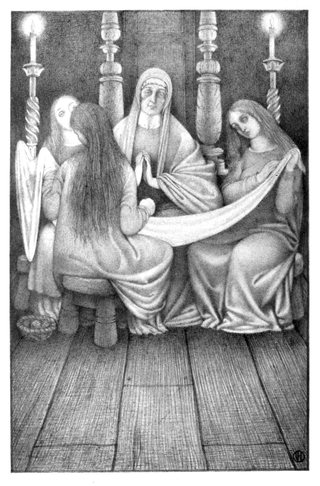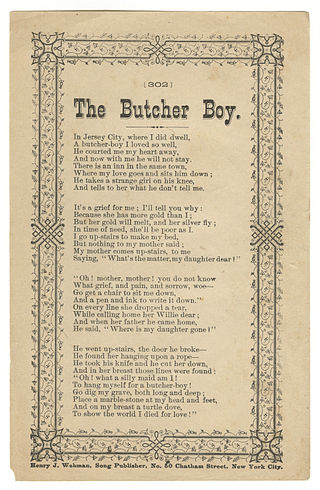
"Barbara Allen" is a traditional folk song that is popular throughout the English-speaking world and beyond. It tells of how the eponymous character denies a dying man's love, then dies of grief soon after his untimely death.

"Lord Randall", or "Lord Randal", is an Anglo-Scottish border ballad consisting of dialogue between a young Lord and his mother. Similar ballads can be found across Europe in many languages, including Danish, German, Magyar, Irish, Swedish, and Wendish. Italian variants are usually titled "L'avvelenato" or "Il testamento dell'avvelenato", the earliest known version being a 1629 setting by Camillo il Bianchino, in Verona. Under the title "Croodlin Doo" Robert Chambers published a version in his "Scottish Ballads" (1829) page 324.
"The Daemon Lover" – also known as "James Harris", "A Warning for Married Women", "The Distressed Ship Carpenter", "James Herries", "The Carpenter’s Wife", "The Banks of Italy", or "The House-Carpenter" – is a popular ballad dating from the mid-seventeenth century, when the earliest known broadside version of the ballad was entered in the Stationers' Register on 21 February 1657.
"Foggy Dew" or "Foggy, Foggy Dew" is an English folk song with a strong presence in the South of England and the Southern United States in the nineteenth century. The song describes the outcome of an affair between a weaver and a girl he courted. It is cataloged as Laws No. O03 and Roud Folk Song Index No. 558. It has been recorded by many traditional singers including Harry Cox, and a diverse range of musicians including Benjamin Britten, Burl Ives, A.L. Lloyd and Ye Vagabonds have arranged and recorded popular versions of the song.

"Matty Groves", also known as "Little Musgrave and Lady Barnard" or "Little Musgrave", is a ballad probably originating in Northern England that describes an adulterous tryst between a young man and a noblewoman that is ended when the woman's husband discovers and kills them. It is listed as Child ballad number 81 and number 52 in the Roud Folk Song Index. This song exists in many textual variants and has several variant names. The song dates to at least 1613, and under the title Little Musgrave and Lady Barnard is one of the Child ballads collected by 19th-century American scholar Francis James Child.
"Mary Hamilton", or "The Fower Maries", is a common name for a well-known sixteenth-century ballad from Scotland based on an apparently fictional incident about a lady-in-waiting to a Queen of Scotland. It is Child Ballad 173 and Roud 79.

"The Raggle Taggle Gypsy" (Roud 1, Child 200), is a traditional folk song that originated as a Scottish border ballad, and has been popular throughout Britain, Ireland and North America. It concerns a rich lady who runs off to join the gypsies (or one gypsy). Common alternative names are "Gypsy Davy", "The Raggle Taggle Gypsies O", "The Gypsy Laddie(s)", "Black Jack David" (or "Davy") and "Seven Yellow Gypsies".

"The Two Sisters" is a traditional murder ballad, dating at least as far back as the mid 17th century. The song recounts the tale of a girl drowned by her jealous sister. At least 21 English variants exist under several names, including "Minnorie" or "Binnorie", "The Cruel Sister", "The Wind and Rain", "Dreadful Wind and Rain", "The Bonny Swans" and the "Bonnie Bows of London". The ballad was collected by renowned folklorist Francis J. Child as Child Ballad 10 and is also listed in the Roud Folk Song Index. Whilst the song is thought to originate somewhere around England or Scotland, extremely similar songs have been found throughout Europe, particularly in Scandinavia.
The Famous Flower of Serving-Men or The Lady Turned Serving-Man is a traditional English language folk song and murder ballad. Child considered it as closely related to the ballad "The Lament of the Border Widow" or "The Border Widow's Lament".
"Unusually, it is possible to give a precise date and authorship to this ballad. It was written by the prolific balladeer, Laurence Price, and published in July 1656, under the title of The famous Flower of Serving-Men. Or, The Lady turn'd Serving-Man. It lasted in the mouths of ordinary people for three hundred years: what a tribute to the work of any writer, leave alone the obscure Laurence Price. Oral tradition, however, has made changes. The original has twenty-eight verses and a fairy-tale ending: “And then for fear of further strife, / he took Sweet William to be his Wife: / The like before was never seen, / A Serving-man to be a Queen”. – Roy Palmer, A Book of British Ballads
"Young Beichan", also known as "Lord Bateman", "Lord Bakeman", "Lord Baker", "Young Bicham" and "Young Bekie", is a traditional folk ballad categorised as Child ballad 53 and Roud 40. The earliest versions date from the late 18th century, but it is probably older, with clear parallels in ballads and folktales across Europe. The song was popular as a broadside ballad in the nineteenth century, and survived well into the twentieth century in the oral tradition in rural areas of most English speaking parts of the world, particularly in England, Scotland and Appalachia.

"Lord Thomas and Fair Annet", also known as "Lord Thomas and Fair Eleanor", is an English folk ballad.
"The Twa Magicians", "The Two Magicians", "The Lady and the Blacksmith", or "The Coal Black Smith" is a British folk song. It first appears in print in 1828 in two sources, Peter Buchan's Ancient Ballads and Songs of the North of Scotland and John Wilson's Noctes Ambrosianae #40. It was later published as number 44 of Francis James Child's English and Scottish Popular Ballads. During the 20th century, versions of it have been recorded by a number of folk and popular musicians.

"Fair Margaret and Sweet William" is a traditional English ballad which tells of two lovers, one or both of whom die from heartbreak. Thomas Percy included it in his 1765 Reliques and said that it was quoted as early as 1611 in the Knight of the Burning Pestle. In the United States, variations of Fair Margaret were regarded as folk song as early as 1823.
The Farmer's Curst Wife is a traditional English language folk song listed as Child ballad number 278 and number 160 in the Roud Folk Song Index.
"The Knight and the Shepherd’s Daughter" is an English ballad, collected by Francis James Child as Child Ballad 110 and listed as number 67 in the Roud Folk Song Index.
"The Cruel Brother" is a folk song.
"Edward" is a traditional murder ballad existing in several variants, categorised by Francis James Child as Child Ballad number 13 and listed as number 200 in the Roud Folk Song Index. The ballad, which is at least 250 years old, has been documented and recorded numerous times across the English speaking world into the twentieth century.
"Babylon", also called "The Bonnie Banks o' Fordie" or "The Banks o' Airdrie" is an English-language folk song.
Mr. Motherwell gives a version under the title of Babylon; or, the Bonny Banks o' Fordie; and Mr. Kinloch gives another under the title of The Duke of Perth's Three Daughters. Previous editors have attempted to find a local habitation for this tradition, and have associated it with the family of Drummond, of Perth. As a legend exactly similar is current in Denmark, this appears a bootless quest.

"The Twa Brothers" is a traditional ballad existing in many variants.

"The Butcher’s Boy" or "The Butcher Boy" is an American folk song derived from traditional English ballads. Folklorists of the early 20th century considered it to be a conglomeration of several English broadside ballads, tracing its stanzas to "Sheffield Park", "The Squire's Daughter", "A Brisk Young Soldier", "A Brisk Young Sailor" and "Sweet William " and "Died for Love".








